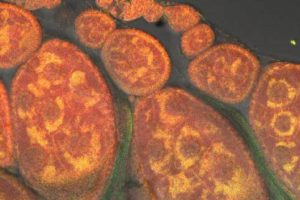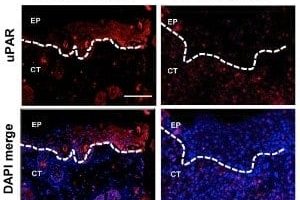journal of cell biology
Diametric shift in 2 protein levels spurs Alzheimer’s plaque accumulation
AUGUSTA, Ga. — A diametric shift in the levels of two proteins involved in folding, moving and cutting other proteins enables accumulation of the destructive brain plaque found in Alzheimer’s disease, researchers report.
VPS35 is a protein that fold…
Macho muscle cells force their way to fusion
In fact, according to new research from Johns Hopkins, the fusion of muscle cells is a power struggle that involves a smaller mobile antagonist that points at, pokes and finally pushes into its larger, stationary partner using a newly identified …
Expanding drug development horizons: Receptor behaviors observed in living cell membranes
Kyoto, Japan — Unprecedented single molecule imaging movies of living cell membranes, taken by a research team based at Kyoto University and the University of New Mexico, have clarified a decades-old enigma surrounding receptor molecule behaviors. …
Chaperone enzyme provides new target for cancer treatments
UNC scientists who study how cells repair damage from environmental factors like sunlight and cigarette smoke have discovered how a “chaperone” enzyme plays a key role in cells’ ability to tolerate the DNA damage that leads to cancer and other disea…
Trigger mechanism provides ‘quality control’ in cell division
SALT LAKE CITY, November 22, 2010 — Researchers from Huntsman Cancer Institute (HCI) at the University of Utah report that they have identified a previously undiscovered trigger mechanism for a quality control checkpoint at the very end of the cel…
‘Reaper’ protein strikes at mitochondria to kill cells
Our cells live ever on the verge of suicide, requiring the close attention of a team of molecules to prevent the cells from pulling the trigger. This self-destructive tendency can be a very good thing, as when dangerous precancerous cells are permit…
Researchers define role of CEP290 in maintaining ciliary function
A new study in the September 6 issue of the Journal of Cell Biology (www.jcb.org) helps define the role of an important ciliary protein, CEP290. The results could be applied toward targeted gene therapy in cilia-related diseases.
Mutations in hu…
With HMGB1’s help, cells dine in
Like some people, cells eat when they are under pressure — but they consume parts of themselves. A multi-function protein helps control this form of cannibalism, according to a study in the September 6 issue of the Journal of Cell Biology (ww…
Alzheimer's protein jams mitochondria; resulting 'energy crisis' kills neurons
Opening a new front in the battle against Alzheimer’s disease, scientists at the University of Pennsylvania have found that a protein long associated with the disease inflicts grave damage in a previously unimagined way: It seals off mitochondria in affected neurons, resulting in an “energy crisis” and buildup of toxins that causes cells to die. This pathway, the first specific biochemical explanation for pathologies associated with Alzheimer’s, is detailed in the April 14 issue of the Journal of Cell Biology.
Abnormal Number of Chromosomes is One Step in Cancer Development
Researchers have produced the first laboratory evidence to show that a cell’s possession of an abnormal numbers of chromosomes contributes to the development of cancers. Their report on the role of this chromosomal instability, known as aneuploidy, appears in today’s online edition of the Feb. 3 Journal of Cell Biology. Because 85 percent of human cancer cells possess an abnormal number of chromosomes, researchers have long been curious about the role of aneuploidy in the multistep cancer process.


